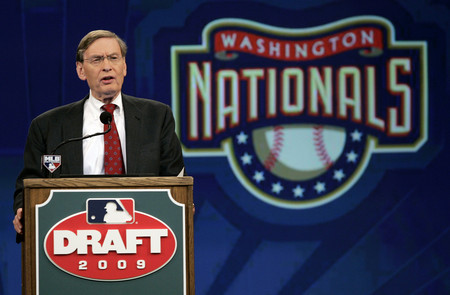Runaway signing bonuses hurt baseball’s prospects for parity

What nobody wants to hear: The problem isn’t Scott Boras. The problem is baseball, at seemingly every turn, can’t wield a strong enough hammer.
It dinks.
It taps.
It pats.
It never seems to pound away.
Stephen Strasburg won’t get $50 million from the Washington Nationals. He might not get close to it. But if he is my son, I want Boras negotiating on his behalf. I want Boras doing as he has done for months — floating such a preposterous figure from which contract talks might commence.
Leverage is often one of life’s inaccessible perks, and those who earn it should do everything in their power to capitalize. Maybe the Nationals will part with $20 million for the No. 1 pick in Tuesday’s amateur draft. The only thing you could say about Boras then is that he did his job in extraordinary fashion.
But there is a bigger picture to all this:
Baseball has this way of never going the distance when attempting to solve its problems or improve its product. Something good usually comes of change, but it mostly has a ground-rule double feel to it.
Take the game’s drug-testing program. It isn’t harsh enough. It falls short. There isn’t enough random testing. Tests still aren’t administered by an independent organization. Penalties still lack when compared to the World Anti-Doping Agency’s suggested model.
The program still has a lot of Russell Martin to it, still defined by its warning-track power.
Take the draft, which on Tuesday was shown in prime time with Strasburg the featured attraction and Bud Selig the bizarre commissioner who after announcing each selection, blinked several times and smacked his lips like a hungry golden retriever.
One thing never changes about baseball: Buddy is one strange creature.
Strasburg’s status at San Diego State while blowing away overmatched hitters elevated him to almost mythical standards, because nothing creates legend faster than three digits on a radar gun, which soon will create a record-setting deal crafted by Boras.
“Let’s not put (Strasburg) in the Hall of Fame yet,” former major league general manager John Hart said as part of the MLB television broadcast. “This is not an easy game. You don’t just step off a college campus and succeed immediately. The landscape is littered with guys who failed.”
True, but Strasburg is one who owns unlimited capability, which means he possesses great value. Such is the case in all walks of life. People invest large amounts of money all the time based merely on the promise of a return. The baseball draft should be no different if the system remains as it is.
Not that there is much of one.
Expecting teams to annually adhere to baseball’s recommended slotting system for high draft picks such as Strasburg is to expect Terrell Owens to play an NFL season without creating controversy.
Teams spent $36 million more on the draft last year than in 2007. This is what happens when the league suggests instead of demands.
And when teams don’t show a willingness to pay quickly, the number of draft holdouts only increases, because they know when push comes to shove and fans of a hopeless team such as Washington are asked to renew season tickets, you’d better have signed what many think is the greatest pitching prospect in history.
The NBA’s rookie salary cap works. It might have caused a handful of prospects to choose more lucrative contracts in Europe, but it hasn’t cost the league any instant stars. What has been a positive in basketball should have been in some form duplicated in baseball and football years ago.
Equity in baseball can’t be reached by the current draft model, so instead of risking charges of collusion by secretly threatening action against teams who pay over the recommended scale, baseball needs to sharpen its stance when the current collective bargaining agreement expires in 2011.
As the draft stands today, a phenom such as Strasburg is worth every zero Boras can have attached to his signing bonus. The Nationals on Tuesday threw signability to the wind because they had no other choice, but that’s still not the case with all teams.
Slotting needs to become mandatory. Baseball has two years to hammer out a legitimate course of action on draft signing bonuses and bring to its game the kind of parity it swears to desire.
Let’s hope this time, Buddy and his gang finally hit with a little force.
Las Vegas Review-Journal sports columnist Ed Graney can be reached at 702-383-4618 or egraney@reviewjournal.com.